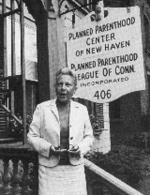Griswold v. Connecticut
From dKosopedia
Category: Supreme Court decisions
Griswold, and others violated Connecticut law in providing contraceptive information, devices, and drugs to a married Connecticut couple. They appealed their conviction to the Supreme Court, arguing the law violated the 14th Amendment. The Supreme Court agreed. Citing the First, Third, Fourth, Fifth and Ninth Amendments, the Supreme Court found that the right to privacy is implicit in the Constitution, and that it precludes laws such as Connecticut.
Contents |
Background
An 1879 Connecticut law (originally written by P.T. Barnum, of circus fame) forbade any use of contraception or the assisting of anyone seeking contraception. The statute held that any person who uses any drug, medicinal article or instrument for the purpose of preventing conception shall be fined not less than fifty dollars or imprisoned not less than sixty days nor more than one year or be both fined and imprisoned.
This statute was challenged and first reached the Supreme Court in the 1961 case, Poe v. Ullman. The Court dismissed the claim of a doctor and his patients that the Connecticut law denied their Fourteenth Amendment Due Process rights, on the ground that the plaintiffs lacked standing to sue because the law had not been enforced in many years. In Poe v. Ullman, Justice John Marshall Harlan II wrote one of the most-cited dissenting opinions in Supreme Court history, arguing for a broad interpretation of the "liberty" protected by the Due Process Clause.
A few months after the Poe decision came down, Estelle Griswold opened a birth control clinic in New Haven, Connecticut, Planned Parenthood League of Connecticut, to dispense contraceptives, in order to test Connecticut's law once again.
Griswold, the Director of the Planned Parenthood League of Connecticut, and C. Lee Buxton, a physician who served as the Medical Director of the League, were arrested and charged with aiding and abetting the commission of this crime under the Connecticut statute.
After a trial, they were found guilty as charged as accessories for giving a married couple information and medical advice on how to prevent conception and, following examination, prescribing a contraceptive device for the wife's use and appealed the case.
On appeal, both the Appellate Division of the Circuit Court and the Connecticut Supreme Court affirmed the judgments of conviction. The Connecticut Supreme Court concluded that the conviction of Griswold and Buxton was not an invasion of constitutional rights. Griswold and Buxton appealed their case to the United States Supreme Court.
The Decision
The Supreme Court took the case upon appeal and overturned the convictions and invalidated the Connecticut law. The majority opinion, authored by William O. Douglas, joined by Chief Justice Earl Warren, and Justices Tom C. Clark, William J. Brennan, Jr., and Arthur J. Goldberg, found a "right of privacy" in the penumbras of the first ten amendments of the Bill of Rights. A concurring opinion by Justice Arthur J. Goldberg, joined by Chief Justice Earl Warren and Justice William J. Brennan, Jr. argued that the existence of the "right of privacy" was bolstered by the Ninth Amendment's protection of unenumerated rights. Justice Goldberg wrote:
- Since 1791 (the Ninth Amendment) has been a basic part of the Constitution which we are sworn to uphold. To hold that a right so basic and fundamental and so deep-rooted in our society as the right of privacy in marriage may be infringed because that right is not guaranteed in so many words by the first eight amendments to the Constitution is to ignore the Ninth Amendment and to give it no effect whatsoever.
Justices John Marshall Harlan II and Byron White concurred in the judgment invalidating the Connecticut law, but based their opinions relying on the Due Process Clause of the Fourteenth Amendment. Harlan, in particular, urged that the Due Process Clause protected liberties unenumerated in the first ten amendments of the Bill of Rights.
Justices Potter Stewart and Hugo Black dissented, denying the existence of a general "right of privacy," and fearing the consequences of a departure from the Constitution's text. Stewart wrote:
- The Ninth Amendment ... [was intended] to make clear that the adoption of the Bill of Rights did not alter the plan that the Federal Government was to be a government of express and limited powers, and that all rights and powers not delegated to it were retained by the people and the individual States. Until today no member of this Court has ever suggested that the Ninth Amendment meant anything else.
He also stated that though he believed the Connecticut law was an "uncommonly silly one", he did not believe it in his power under the Constitution to invalidate it.
Black wrote:
- The Court talks about a constitutional "right of privacy" as though there is some constitutional provision or provisions forbidding any law ever to be passed which might abridge the "privacy" of individuals. But there is not.
The Griswold case focused on the privacy rights of married couples. A later case, Eisenstadt v. Baird, established the right of unmarried people to contraception. The imprtance of this decsion went far beyond the issue of contraception however.
This decision went a long way to establishing a basic sphere of personal privacy to which all people are entitled. If followed, it would place the burden on the government to demonstrate why it is justified in interfering with your life rather than requiring you to demonstrate that the text of the Constitution specifically and narrowly prohibits the government's actions.
The Griswold decision paved the way for the much more contentious Roe v. Wade ruling, which acknowledged that women's medical privacy included a right to determine whether or not their own pregnancy should be carried to full term, and hence legalizing abortion in the United States.
Opinions
- Syllabus
- Opinion-Douglas
- Concurrence-Goldberg
- Concurrence-Harlan
- Concurrence-White
- Dissent-Black
- Dissent-Stewart

![[Main Page]](../../../../upload/banner-blue-135.jpg)